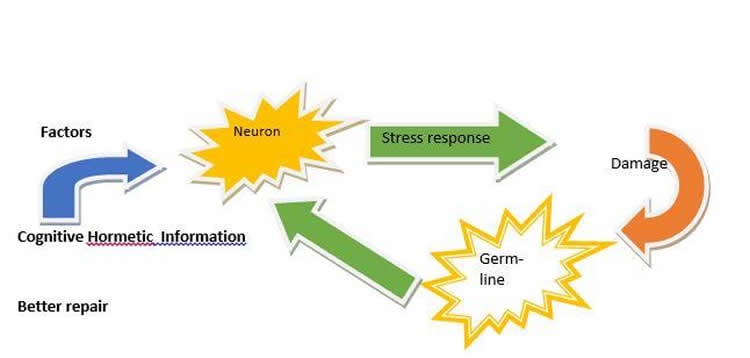Summary: A new study describes how advances in technology can help us avoid aging and age related diseases.
Source: Bentham Science Publishers.
It appears inevitable that technology is increasingly taking over our lives. However, it seems that it can also help us avoid ageing and age-related disease, in a way that has not been described before.
We are experiencing an interacting amalgamation of humans and technology. Our research shows that, if we engage with technology in a positive and meaningful way, we increase the information load to our brain and this has several effects on our biology. For example, when a positive amount of information (i.e. not too little and not too much, but just pleasantly challenging) reaches our brain cells (neurons), these neurons react by activating the ‘neuronal stress response’ mechanisms. In essence, this response aims to contain the slight stress caused by the challenge tothe neuron, and leaves the neuron healthy and more ‘information-rich’.
The information overload of our modern society represents one such positive challenge, known as a ‘hormetic stressor’. Hormesis is a widespread phenomenon characterized by a ‘low-dose activation, high-dose inhibition’ principle. This means that a low dose of any given stimulus (a challenge) can stimulate the organism in a positive way and result in health improvement, whereas an excessive or suboptimal exposure of the same stimulus can result in damage and disease. So, a challenging exposure to information technology results in brain improvement.
But this is not all. During the neuronal stress response there is production of factors (such as Protein kinase RNA-like endoplasmic reticulum kinase, Activating-transcription-factor-6, and Mitogen-activated protein kinases), which are in direct competition with the germline – the cells and elements of our sperm and eggs. This competition takes place due to the fact that repair resources are limited: age-related damage happens because the repair resources have been directed by evolution to the germline, in order to assure a good repair mechanism and thus continuation of the species, leaving limited resources to repair of the rest of the body. Therefore, we age and die, with our genes being passed unharmed to the next generation. But, our research indicates that the activation of neuronal stress response diverts these repair resources from the germline back to the neuron and thus the neuron remains healthy and functions for longer.

In summary then, information technology is placing an increased cognitive load on our brain. This hormetic (positive) stress places our neurons under continual pressure to repair themselves. This reverses the existing natural preference for allocating repair resources to the germline,with the neurons becoming able to fully repair any age-related damage, and thus function better. In this way, the hormetic cognitive stress originating from exposure to information derived from new technology, may result in a reduction of ageing and age-related diseases.
Source: Faizan ul Haq – Bentham Science Publishers
Image Source: NeuroscienceNews.com image is credited to Dr. Marios Kyriazis.
Original Research: Abstract for “Neurons vs. Germline: A War of Hormetic Tradeoffs” by Marios Kyriazis in Current Aging Science. Published online May 19 2017 doi:10.2174/1874609810666170413123547
[cbtabs][cbtab title=”MLA”]Bentham Science Publishers “Stressing the Brain Through Technology May Reduce Age Related Diseases.” NeuroscienceNews. NeuroscienceNews, 19 May 2017.
<https://neurosciencenews.com/tech-brain-aging-6726/>.[/cbtab][cbtab title=”APA”]Bentham Science Publishers (2017, May 19). Stressing the Brain Through Technology May Reduce Age Related Diseases. NeuroscienceNew. Retrieved May 19, 2017 from https://neurosciencenews.com/tech-brain-aging-6726/[/cbtab][cbtab title=”Chicago”]Bentham Science Publishers “Stressing the Brain Through Technology May Reduce Age Related Diseases.” https://neurosciencenews.com/tech-brain-aging-6726/ (accessed May 19, 2017).[/cbtab][/cbtabs]
Abstract
Neurons vs. Germline: A War of Hormetic Tradeoffs
The process of human ageing is significantly dependent upon events which are currently shaping humanity. One such event is the seemingly inexorable progress of technology, and specifically, digital communications technology. Technology and biology are tightly interconnected, and this has a direct relevance on how our own ageing mechanisms are evolving and adapting to the change. One way technology may affect biological ageing is based on the concept of information exposure which acts as a hormetic stimulus and up-regulates neuronal stress response pathways. In this way, neurons become increasingly more likely to acquire repair resources and function for longer, with a consequent overall improvement in healthy lifespan. At the same time, germline repair mechanisms may need to be downgraded in order to accommodate a tradeoff: a corresponding escalation of repairs in neurons. In this Opinion paper I discuss how a meaningful and intentional integration with technology, which hormetically challenges our cognition, may redress the conflict for resources between the soma and the germline, and result in a reduction of age-related dysfunction in participating humans.
“Neurons vs. Germline: A War of Hormetic Tradeoffs” by Marios Kyriazis in Current Aging Science. Published online May 19 2017 doi:10.2174/1874609810666170413123547






